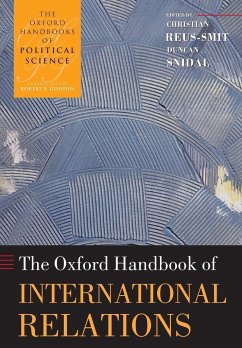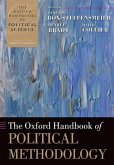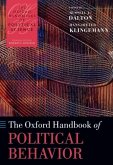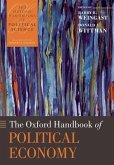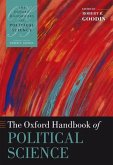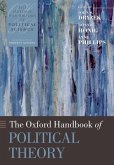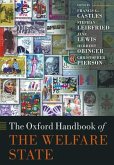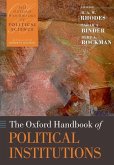Christian Reus-Smit / Duncan Snidal (Hrsg.)
Oxford Handbook of International Relations
Herausgeber: Reus-Smit, Christian; Snidal, Duncan
Christian Reus-Smit / Duncan Snidal (Hrsg.)
Oxford Handbook of International Relations
Herausgeber: Reus-Smit, Christian; Snidal, Duncan
- Broschiertes Buch
- Merkliste
- Auf die Merkliste
- Bewerten Bewerten
- Teilen
- Produkt teilen
- Produkterinnerung
- Produkterinnerung
This Oxford Handbook assembles the world's leading scholars in International Relations to present diverse perspectives about purposes, questions, theories, and methods. It will become the first point of reference for scholars and students interested in these key issues.
Andere Kunden interessierten sich auch für
![Oxford Handbook of Political Methodology Oxford Handbook of Political Methodology]() Janet M Box-SteffensmeierOxford Handbook of Political Methodology47,99 €
Janet M Box-SteffensmeierOxford Handbook of Political Methodology47,99 €![The Oxford Handbook of Political Behavior The Oxford Handbook of Political Behavior]() The Oxford Handbook of Political Behavior47,99 €
The Oxford Handbook of Political Behavior47,99 €![The Oxford Handbook of Political Economy The Oxford Handbook of Political Economy]() Barry R. Weingast (Ward C. Krebs Family Professor of Political ScieThe Oxford Handbook of Political Economy47,99 €
Barry R. Weingast (Ward C. Krebs Family Professor of Political ScieThe Oxford Handbook of Political Economy47,99 €![The Oxford Handbook of Political Science The Oxford Handbook of Political Science]() The Oxford Handbook of Political Science82,99 €
The Oxford Handbook of Political Science82,99 €![The Oxford Handbook of Political Theory The Oxford Handbook of Political Theory]() John S Dryzek (Professor of Social and Australian Political TheoryThe Oxford Handbook of Political Theory47,99 €
John S Dryzek (Professor of Social and Australian Political TheoryThe Oxford Handbook of Political Theory47,99 €![The Oxford Handbook of the Welfare State The Oxford Handbook of the Welfare State]() The Oxford Handbook of the Welfare State47,99 €
The Oxford Handbook of the Welfare State47,99 €![The Oxford Handbook of Political Institutions The Oxford Handbook of Political Institutions]() R. A. W. Rhodes (Professor of Government in the School of GovernmenThe Oxford Handbook of Political Institutions47,99 €
R. A. W. Rhodes (Professor of Government in the School of GovernmenThe Oxford Handbook of Political Institutions47,99 €-
-
-
This Oxford Handbook assembles the world's leading scholars in International Relations to present diverse perspectives about purposes, questions, theories, and methods. It will become the first point of reference for scholars and students interested in these key issues.
Hinweis: Dieser Artikel kann nur an eine deutsche Lieferadresse ausgeliefert werden.
Hinweis: Dieser Artikel kann nur an eine deutsche Lieferadresse ausgeliefert werden.
Produktdetails
- Produktdetails
- Oxford Handbooks
- Verlag: Oxford University Press
- Seitenzahl: 788
- Erscheinungstermin: 1. Juli 2010
- Englisch
- Abmessung: 244mm x 170mm x 42mm
- Gewicht: 1334g
- ISBN-13: 9780199585588
- ISBN-10: 019958558X
- Artikelnr.: 29730606
- Herstellerkennzeichnung
- Libri GmbH
- Europaallee 1
- 36244 Bad Hersfeld
- gpsr@libri.de
- Oxford Handbooks
- Verlag: Oxford University Press
- Seitenzahl: 788
- Erscheinungstermin: 1. Juli 2010
- Englisch
- Abmessung: 244mm x 170mm x 42mm
- Gewicht: 1334g
- ISBN-13: 9780199585588
- ISBN-10: 019958558X
- Artikelnr.: 29730606
- Herstellerkennzeichnung
- Libri GmbH
- Europaallee 1
- 36244 Bad Hersfeld
- gpsr@libri.de
Professor Reus-Smit's research focuses on the politics of international ethics and institutions, and he has published widely on issues of global governance, multilateralism, human rights, and international relations theory. Professor Reus-Smit is currently engaged in projects on Resolving International Crises of Legitimacy (funded by the British Academy and the Rockefeller Foundation), and on the role of rights politics in the development of the modern international system (funded by the Australian Research Council). Duncan Snidal is an Associate Professor in the Harris School, the Department of Political Science, and Chair of the Committee on International Relations. Snidal's research focuses on international relations with an emphasis on international political economy and institutions. He has worked on problems of international cooperation, including how the distribution of capability and interests affects outcomes. He is currently working on the role of international institutions, including law and formal organizations, in promoting cooperation. Snidal is also interested in applying formal techniques to policy analysis. He is Director of the Program on International Politics, Economics, and Security (PIPES) and is currently Chair of the Committee on International Relations at the University of Chicago.
* Part I Introduction
* 1: Christian Reus-Smit and Duncan Snidal: Between utopia and reality:
the practical discourses of international relations
* Part II Imagining the discipline
* 2: David A. Lake: The state and international relations
* 3: Michael Barnett and Kathryn Sikkink: From international relations
to global society
* 4: Robert Cox: The point is not just to explain the world but to
change it
* 5: Phillip Darby: A disabling discipline?
* Part III Major theoretical perspectives
* 6: Peter Katzenstein and Rudra Sil: Eclectic theorizing in the study
and practice of international relations
* 7: William C. Wohlforth: Realism
* 8: Jack Donnelly: The ethics of realism
* 9: Benno Teschke: Marxism
* 10: Nicholas Rengger: The ethics of Marxism
* 11: Arthur A. Stein: Neoliberal institutionalism
* 12: James L. Richardson: The ethics of neoliberal institutionalism
* 13: Andrew Moravscik: The new liberalism
* 14: Gerry Simpson: The ethics of the new liberalism
* 15: Tim Dunne: The English School
* 16: Molly Cochran: The ethics of the English School
* 17: Ian Hurd: Constructivism
* 18: Richard Price: The ethics of constructivism
* 19: Richard Shapcott: Critical theory
* 20: Robyn Eckersley: The ethics of critical theory
* 21: Anthony Burke: Postmodernism
* 22: Peter Lawler: The ethics of postmodernism
* 23: Sandra Whitworth: Feminism
* 24: Jacqui True: The ethics of feminism
* Part IV The question of method
* 25: Andrew H. Kydd: Methodological individualism and rational choice
* 26: Friedrich Kratochwil: Sociological approaches
* 27: James Goldgeier and Philip Tetlock: Psychological approaches
* 28: Edward D. Mansfield and Jon C. Pevehouse: Quantitative approaches
* 29: Andrew Bennett and Colin Elman: Case study methods
* 30: Joel Quirk: Historical methods
* Part V Bridging the subfield boundaries
* 31: John Ravenhill: International political economy
* 32: Robert Ayson: Strategic studies
* 33: Douglas T. Stuart: Foreign policy decision-making
* 34: Terry Nardin: International ethics
* 35: Michael Byers: International law
* Part VI The scholar and the policy-maker
* 36: Henry R. Nau: Scholarship and policy-making: who speaks truth to
whom?
* 37: Joseph S. Nye, Jr: International relations: the relevance of
theory to practice
* Part VII The question of diversity
* 38: David L. Blaney and Naeem Inayatullah: International relations
from below
* 39: Richard Little: International relations theory from a former
hegemon
* Part VIII Old and new
* 40: Janice Bially Mattern: The concept of power and the
(un)discipline of international relations
* 41: Toni Erskine: Locating responsibility: the problem of moral
agency in international relations
* 42: Robert O. Keohane: Big questions in the study of world politics
* 43: Richard Rosecrance: The failure of static and the need for
dynamic approaches to international relations
* 44: Steve Smith: Six wishes for a more relevant discipline of
international relations
* 1: Christian Reus-Smit and Duncan Snidal: Between utopia and reality:
the practical discourses of international relations
* Part II Imagining the discipline
* 2: David A. Lake: The state and international relations
* 3: Michael Barnett and Kathryn Sikkink: From international relations
to global society
* 4: Robert Cox: The point is not just to explain the world but to
change it
* 5: Phillip Darby: A disabling discipline?
* Part III Major theoretical perspectives
* 6: Peter Katzenstein and Rudra Sil: Eclectic theorizing in the study
and practice of international relations
* 7: William C. Wohlforth: Realism
* 8: Jack Donnelly: The ethics of realism
* 9: Benno Teschke: Marxism
* 10: Nicholas Rengger: The ethics of Marxism
* 11: Arthur A. Stein: Neoliberal institutionalism
* 12: James L. Richardson: The ethics of neoliberal institutionalism
* 13: Andrew Moravscik: The new liberalism
* 14: Gerry Simpson: The ethics of the new liberalism
* 15: Tim Dunne: The English School
* 16: Molly Cochran: The ethics of the English School
* 17: Ian Hurd: Constructivism
* 18: Richard Price: The ethics of constructivism
* 19: Richard Shapcott: Critical theory
* 20: Robyn Eckersley: The ethics of critical theory
* 21: Anthony Burke: Postmodernism
* 22: Peter Lawler: The ethics of postmodernism
* 23: Sandra Whitworth: Feminism
* 24: Jacqui True: The ethics of feminism
* Part IV The question of method
* 25: Andrew H. Kydd: Methodological individualism and rational choice
* 26: Friedrich Kratochwil: Sociological approaches
* 27: James Goldgeier and Philip Tetlock: Psychological approaches
* 28: Edward D. Mansfield and Jon C. Pevehouse: Quantitative approaches
* 29: Andrew Bennett and Colin Elman: Case study methods
* 30: Joel Quirk: Historical methods
* Part V Bridging the subfield boundaries
* 31: John Ravenhill: International political economy
* 32: Robert Ayson: Strategic studies
* 33: Douglas T. Stuart: Foreign policy decision-making
* 34: Terry Nardin: International ethics
* 35: Michael Byers: International law
* Part VI The scholar and the policy-maker
* 36: Henry R. Nau: Scholarship and policy-making: who speaks truth to
whom?
* 37: Joseph S. Nye, Jr: International relations: the relevance of
theory to practice
* Part VII The question of diversity
* 38: David L. Blaney and Naeem Inayatullah: International relations
from below
* 39: Richard Little: International relations theory from a former
hegemon
* Part VIII Old and new
* 40: Janice Bially Mattern: The concept of power and the
(un)discipline of international relations
* 41: Toni Erskine: Locating responsibility: the problem of moral
agency in international relations
* 42: Robert O. Keohane: Big questions in the study of world politics
* 43: Richard Rosecrance: The failure of static and the need for
dynamic approaches to international relations
* 44: Steve Smith: Six wishes for a more relevant discipline of
international relations
* Part I Introduction
* 1: Christian Reus-Smit and Duncan Snidal: Between utopia and reality:
the practical discourses of international relations
* Part II Imagining the discipline
* 2: David A. Lake: The state and international relations
* 3: Michael Barnett and Kathryn Sikkink: From international relations
to global society
* 4: Robert Cox: The point is not just to explain the world but to
change it
* 5: Phillip Darby: A disabling discipline?
* Part III Major theoretical perspectives
* 6: Peter Katzenstein and Rudra Sil: Eclectic theorizing in the study
and practice of international relations
* 7: William C. Wohlforth: Realism
* 8: Jack Donnelly: The ethics of realism
* 9: Benno Teschke: Marxism
* 10: Nicholas Rengger: The ethics of Marxism
* 11: Arthur A. Stein: Neoliberal institutionalism
* 12: James L. Richardson: The ethics of neoliberal institutionalism
* 13: Andrew Moravscik: The new liberalism
* 14: Gerry Simpson: The ethics of the new liberalism
* 15: Tim Dunne: The English School
* 16: Molly Cochran: The ethics of the English School
* 17: Ian Hurd: Constructivism
* 18: Richard Price: The ethics of constructivism
* 19: Richard Shapcott: Critical theory
* 20: Robyn Eckersley: The ethics of critical theory
* 21: Anthony Burke: Postmodernism
* 22: Peter Lawler: The ethics of postmodernism
* 23: Sandra Whitworth: Feminism
* 24: Jacqui True: The ethics of feminism
* Part IV The question of method
* 25: Andrew H. Kydd: Methodological individualism and rational choice
* 26: Friedrich Kratochwil: Sociological approaches
* 27: James Goldgeier and Philip Tetlock: Psychological approaches
* 28: Edward D. Mansfield and Jon C. Pevehouse: Quantitative approaches
* 29: Andrew Bennett and Colin Elman: Case study methods
* 30: Joel Quirk: Historical methods
* Part V Bridging the subfield boundaries
* 31: John Ravenhill: International political economy
* 32: Robert Ayson: Strategic studies
* 33: Douglas T. Stuart: Foreign policy decision-making
* 34: Terry Nardin: International ethics
* 35: Michael Byers: International law
* Part VI The scholar and the policy-maker
* 36: Henry R. Nau: Scholarship and policy-making: who speaks truth to
whom?
* 37: Joseph S. Nye, Jr: International relations: the relevance of
theory to practice
* Part VII The question of diversity
* 38: David L. Blaney and Naeem Inayatullah: International relations
from below
* 39: Richard Little: International relations theory from a former
hegemon
* Part VIII Old and new
* 40: Janice Bially Mattern: The concept of power and the
(un)discipline of international relations
* 41: Toni Erskine: Locating responsibility: the problem of moral
agency in international relations
* 42: Robert O. Keohane: Big questions in the study of world politics
* 43: Richard Rosecrance: The failure of static and the need for
dynamic approaches to international relations
* 44: Steve Smith: Six wishes for a more relevant discipline of
international relations
* 1: Christian Reus-Smit and Duncan Snidal: Between utopia and reality:
the practical discourses of international relations
* Part II Imagining the discipline
* 2: David A. Lake: The state and international relations
* 3: Michael Barnett and Kathryn Sikkink: From international relations
to global society
* 4: Robert Cox: The point is not just to explain the world but to
change it
* 5: Phillip Darby: A disabling discipline?
* Part III Major theoretical perspectives
* 6: Peter Katzenstein and Rudra Sil: Eclectic theorizing in the study
and practice of international relations
* 7: William C. Wohlforth: Realism
* 8: Jack Donnelly: The ethics of realism
* 9: Benno Teschke: Marxism
* 10: Nicholas Rengger: The ethics of Marxism
* 11: Arthur A. Stein: Neoliberal institutionalism
* 12: James L. Richardson: The ethics of neoliberal institutionalism
* 13: Andrew Moravscik: The new liberalism
* 14: Gerry Simpson: The ethics of the new liberalism
* 15: Tim Dunne: The English School
* 16: Molly Cochran: The ethics of the English School
* 17: Ian Hurd: Constructivism
* 18: Richard Price: The ethics of constructivism
* 19: Richard Shapcott: Critical theory
* 20: Robyn Eckersley: The ethics of critical theory
* 21: Anthony Burke: Postmodernism
* 22: Peter Lawler: The ethics of postmodernism
* 23: Sandra Whitworth: Feminism
* 24: Jacqui True: The ethics of feminism
* Part IV The question of method
* 25: Andrew H. Kydd: Methodological individualism and rational choice
* 26: Friedrich Kratochwil: Sociological approaches
* 27: James Goldgeier and Philip Tetlock: Psychological approaches
* 28: Edward D. Mansfield and Jon C. Pevehouse: Quantitative approaches
* 29: Andrew Bennett and Colin Elman: Case study methods
* 30: Joel Quirk: Historical methods
* Part V Bridging the subfield boundaries
* 31: John Ravenhill: International political economy
* 32: Robert Ayson: Strategic studies
* 33: Douglas T. Stuart: Foreign policy decision-making
* 34: Terry Nardin: International ethics
* 35: Michael Byers: International law
* Part VI The scholar and the policy-maker
* 36: Henry R. Nau: Scholarship and policy-making: who speaks truth to
whom?
* 37: Joseph S. Nye, Jr: International relations: the relevance of
theory to practice
* Part VII The question of diversity
* 38: David L. Blaney and Naeem Inayatullah: International relations
from below
* 39: Richard Little: International relations theory from a former
hegemon
* Part VIII Old and new
* 40: Janice Bially Mattern: The concept of power and the
(un)discipline of international relations
* 41: Toni Erskine: Locating responsibility: the problem of moral
agency in international relations
* 42: Robert O. Keohane: Big questions in the study of world politics
* 43: Richard Rosecrance: The failure of static and the need for
dynamic approaches to international relations
* 44: Steve Smith: Six wishes for a more relevant discipline of
international relations

